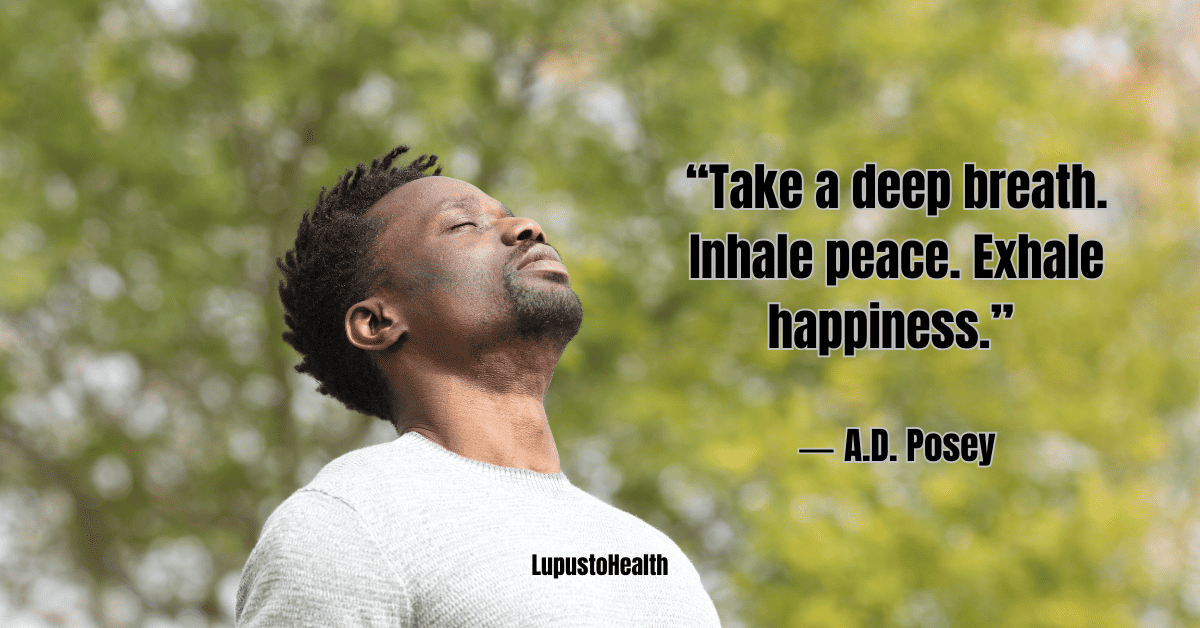Can you believe that the longest a person has gone without sleep is 264 hours? That’s 11 days – and 24 minutes to be precise! Honest
That would end me! Like many lupus patients, I often wake up in the morning still feeling tired. Most of the time this is due to waking in the middle of the night or early morning. [1]
Lack of sleep is a common issue for lupus patients that adds fuel to the blaring fire. Studies show that poor sleep quality in lupus patients make the disease worse. [2] It promotes feelings of fatigue, depression, and anxiety. [3]
What’s more, in an ‘chicken-and-egg’ scenario, some reports show that sleep disturbances may even trigger lupus in the first place! [3][4] For instance, a 2018 study suggests that sleeping less than 7 hours a night will raise a person’s risk of developing lupus. [3] Thus raising the question, is poor sleep a cause or consequence of lupus?
Still, whether you have been battling with your sleep before your diagnosis or not. Understand that it doesn’t have to be this way. Sleep is far too important to your health to be a forgotten book on the shelf. Especially when around 80% of lupus patients report sleeping issues. [5]
In this article we will discover the hidden link between sleep and systemic lupus. Covering ways in which you can take control of your health today by improving your sleep quality.

Why is sleep important?
Science suggests that as an adult, you should aim for 7-9 hours of sleep each night.
Meeting this target is essential for physical and mental well-being.
For instance, during sleep, your body: [6]
- Repairs and regenerates tissues
- Regulates hormones
- Consolidates memories.
A lack of sleep can lead to many health problems. These include fatigue and decreased cognitive function (think brain fog). [7] Besides raising your risk of chronic disorders such as: [8]
- Obesity
- Diabetes
- Heart disease
- Depression
Furthermore, sleep plays an essential role in your body’s immune system. For that reason, a lack of sleep can leave people more susceptible to infections.
This happens because sleep disruption changes your immune cells. Reducing their protective effects in the process. What’s more, this effect is long-lasting. Thus, sleep interruptions will increase inflammation in your body (No thank you). Whereas getting enough sleep can lower inflammation (Yes please!) [9]
Additionally, sleep is critical for mental health. A lack of sleep can affect your mood, concentration, and decision-making. Three symptoms many lupus patients battle with on a daily basis as it is.

Impact of sleep disturbances on lupus patients
For your body to be at its best, you need to get enough sleep. When you do not get enough sleep or have trouble sleeping, it can make your lupus worse.
Here are a few examples of how a lack of sleep can affect you and your lupus: [5][10][11][12]
- Fuels fatigue: When you don’t sleep enough, it can make you feel even more tired and your lupus worse. Making it harder to do everyday tasks.
- Lowers cognitive function: Long-term sleep disturbances will impact the ability or functioning of your brain. That is, you will experience poor memory, attention, and concentration. In turn, performing tasks at work or home will become more difficult. Making life harder.
- Takes the fun out of life: Not getting enough sleep can make it challenging to enjoy things and be with friends and family. It can also create a feeling loneliness and sadness.
- Raises your risk of cardiovascular disease: Sleep apnoea can raise your blood pressure and risk of heart and blood vessel problems. This is far from ideal as lupus patients already have a higher chance of cardiovascular disease.
- Worsens pain: Not sleeping well can make your body more sensitive to pain. Making it harder for you to handle and manage your pain, as well as your lupus.
- Increases your chance of depression and anxiety: Not sleeping well can make you more likely to feel sad and worried. Affecting your ability to sleep and enjoy life.

Common sleep disturbances in lupus patients
People with lupus are at an increased risk of experiencing sleep disturbances, due to: [13]
- Insomnia: Some people who have lupus have trouble falling asleep, staying asleep, or feeling rested after sleeping. This is ‘insomnia.’ It can happen because of pain, feeling tired, and the emotional toll of living with lupus.
- Sleep Apnoea: Sleep apnoea is when someone stops breathing for a short time while they sleep. This can make them snore loudly and feel tired during the day. People who have lupus might be more likely to get sleep apnoea because of inflammation in their nose and throat.
- Restless legs syndrome: Restless leg syndrome is when someone has a bad feeling in their legs and can’t stop moving them. It happens a lot at night, which makes it harder for people to sleep.
- Periodic Limb Movement Disorder: Periodic Limb Movement Disorder is when your legs or arms move by themselves while you sleep. It can make it hard to fall asleep and sleep through the night.
- Fatigue: Fatigue is a common problem for people who have lupus. It can make it hard to fall asleep or stay asleep, and make it difficult to do things during the day.
- Depression and anxiety: Some people who have lupus carry a lot of sadness and worry. This emotional weight will make it harder for you to sleep.
– Click here to learn how to fight fatigue with lupus –

Best treatment options for sleep issues
There are several treatment options available for lupus patients with sleep disturbances, including: [14][15][16][17]
- Medications: A doctor can prescribe medicine to help you sleep better. Different medicines can help with different problems, like trouble falling asleep or restless legs.
- Lifestyle changes: There are some things you can do to help you sleep better if you have lupus. Like going to bed at the same time every night, not doing exciting things before bedtime, and making sure your bed is comfortable.
- Behavioural therapies: Sometimes talking to a therapist can help you sleep better. They can teach you ways to think and act that can help you sleep. Doing relaxing things like deep breathing, pictures in your mind and relaxing your muscles can also help you sleep better.
- Continuous Positive Airway Pressure (CPAP) therapy: If someone with lupus has sleep apnoea, a doctor will sometimes give them a special mask to wear at night. It blows air into their nose to help them breathe better and stop the sleep apnoea.
- Light therapy: Sometimes, people with lupus have trouble sleeping because their body’s clock is off. Sitting in front of a special bright light for a little while during the day can help fix the body’s clock and make it easier to sleep at night.
- Melatonin: Melatonin is a hormone that regulates the body’s sleep-wake cycle. It can be used as a supplement to help people with lupus fall asleep and stay asleep.

Sleep deprivation coping strategies
There are many things that you can do to help you sleep better, such as: [18][19][20][21][22]
- Good sleep hygiene: It’s important for people who have lupus to practice good hygiene before bed. This means going to bed at the same time every night, not doing exciting things before bed, and making sure the bed is clean and comfortable.
- Stress management: Stress can make it harder to sleep. So, it’s important to learn ways to calm down and relax like deep breathing, yoga, and meditation. These relaxing activities can help clear your mind and sleep better.
- Relaxation techniques: Doing relaxing things like deep breathing, pictures in your mind and relaxing your muscles can help you to sleep better.
- Exercise: Regular exercise can help improve sleep. But it’s important to avoid vigorous exercise close to bedtime as this will have the opposite effect.
- Diet: Eating a healthy diet and avoiding caffeine, nicotine, and alcohol close to bedtime can help improve sleep.
- Take part in a sleep study: Sometimes, a doctor might offer you a night in a sleep centre. They will watch and study how you sleep to see if there is any problem behind your sleep issues.
- Medication management: It’s important to talk to a doctor about any medicine that you’re taking if you are having trouble sleeping. Certain medicine may be making it hard to sleep, and the doctor might be able to change the medicine or the dosage.
- Mindfulness: Practicing mindfulness can help you to develop a more positive perspective. This will help you tackle your sleep difficulties and feel more in control of your sleep experiences.
– Click here to learn if stress can cause lupus –
Sleep support and resources
There are support and resources available out there for lupus patients. Examples include:
- Patient organisations: The Lupus Foundation of America (LFA) and Lupus UK are national charities that provide information, support, and guidance to people with lupus and their families. They also provide support groups, which provide an opportunity for people to share their experiences and offer support to one another.
- Online communities: There are several online communities for people with lupus, such as the Lupus UK Facebook page, where people can connect with others who have the condition and share information and support.
- National Health Service (NHS) Support: The NHS provides care for people with lupus in the UK, including diagnosis, treatment, and management of the disease. Your GP is your first point of contact and will refer you to specialists such as a rheumatologist, an ophthalmologist, or a dentist if needed.
- Charities: There are some charities in the UK that provide support and information for people with lupus. Arthritis Research UK is one, which provides information and support for people with all types of arthritis, including lupus.
- Research: There are research organisations in the UK that focus on lupus. One such example is the Lupus Research Alliance UK, which supports research into the causes, treatment, and cure of lupus.
Final Comments
It is clear that sleep issues are a common issue in lupus patients that is worsens their health, disease activity and quality of life. Triggering other issues like cardiovascular disease, fatigue, depression and anxiety. Therefore, it is important for you as a lupus patient to focus on getting enough good sleep.
In the UK, lupus patients have access to resources that provide information, support, and guidance. If you are having trouble sleeping, see a doctor and talk about your treatment options. With proper support and care, managing lupus symptoms and improving quality of life is possible. Don’t be afraid to ask for help.